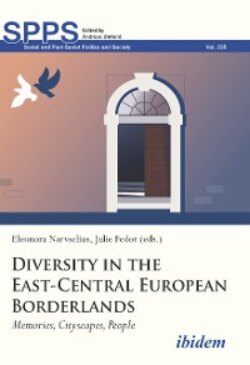Читать книгу Diversity in the East-Central European Borderlands - Группа авторов - Страница 16
На сайте Литреса книга снята с продажи.
Chişinău During and Immediately After World War II
ОглавлениеWhen Bessarabia was ceded to the Soviet Union on 26 June 1940, around 10,000 Jews from remaining Romania fled to Bessarabia to escape anti-Semitism,21 while Jews from Bessarabia fled to Romania to escape Soviet confiscations, hoping to continue on to Palestine (Levin 1987).22
From June 1940 to June 1941, Soviet power rapidly reorganized the society. Around 86,000 persons from the annexed Romanian territories were arrested, deported, sent into forced labor or executed (Caşu 2011: 39–56).23 Out of 60,000 Jews in Chişinău when the Soviet rule began in 1940,24 around 10,000 were deported. When the German-Romanian forces approached Chişinău in 1941, around 20,000 Jews fled eastwards; many of them were captured and killed. Around 10,000 Jews escaped with the retreating Soviet troops. In July 1941, German-Romanian troops killed about 10,000 Jews. The survivors were locked in the ghetto that was established the same month (Shapiro 2015: 14–30, 51–57, 65–74)25 around Piaţa Veche in the Old Town.26 Soon the Romanian troops took over most of the Holocaust activities.27 Encyclopedia Judaica estimates that as many as 53,000 Chişinău Jews died in the Holocaust and as a result of Soviet deportations.28
Chişinău was damaged in several stages. Altogether, 70% of the buildings were destroyed or badly damaged during the war (Nesterov 2011b: 136). An aerial photo taken by the German Luftwaffe on 3 May 1944 shows a city with many burnt out buildings, with only the walls remaining.29 After the Soviet re-annexation of Bessarabia and Chişinău in 1944, arrests and deportations resumed.30 The total number of victims of Stalinist war and postwar terror in 1940–41 and 1944–53 and following famine in present-day Republic of Moldova and the interwar Moldovan Autonomous Soviet Socialist Republic31 is estimated at around 300,000–350,000 (Caşu 2010: 51–52). In the 1940s, Soviet industrialization and urban growth in Chişinău began. Immigrants, including Jews, lacking roots in the city, came from other parts of the Soviet Union. Later many of them emigrated to Israel and elsewhere.
